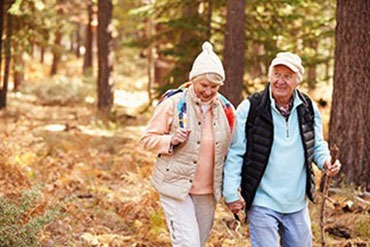 Connecting with nature is paramount to our overall health and well-being. In fact, based on recent studies that show we possess an inherent attraction toward nature, city planners are now putting more emphasis on creating functional green spaces.
Connecting with nature is paramount to our overall health and well-being. In fact, based on recent studies that show we possess an inherent attraction toward nature, city planners are now putting more emphasis on creating functional green spaces.
Researchers hypothesize that, because our hunter-gatherer ancestors existed for thousands of years in outdoor environments, we present-day humans share an innate affiliation with nature. The problem is that we now spend less time outdoors interacting with the natural world even though our brains are hardwired for it. Outdoor workouts allow us to reconnect with nature while providing numerous benefits.
Green Exercise
Green exercise refers to physical activity that takes place outdoors in natural environments. Studies have shown that it contributes to decreased tension, confusion, and anger. Even looking at green space can decrease the stress-related hormones cortisol and adrenalin.
Exposure to natural sunlight combined with physical activity is thought to increase serotonin levels in our bodies, which can improve feelings of well-being and happiness. Serotonin is a mood-enhancing chemical, and a deficiency has been linked to depression, anxiety, fatigue, and impaired cognitive function.
As our world becomes busier, we typically experience more stress and have less time available for physical activity. In one study, Canadians aged 15 and older described most of their days as being “extremely stressful.” Dedicating time each week to exercising outdoors will alleviate stress on busy days and actually improve mental well-being and self-esteem, and may even help fight depression.
English scientists reported that just five minutes of green exercise resulted in improvements in self-esteem and mood. Richard Louv, author of Last Child in the Woods, coined the term “nature-deficit disorder.” He believes human beings spend less time in nature, which contributes to increased behavioral problems, especially among children.
In fact, research has shown that activity levels among children have steadily declined in recent years. Outdoor physical activity may help to correct these issues and dissolve unwanted stress.
Exercise Outdoors and Feel Better
The environment constantly changes when we exercise outdoors; weather, temperature, and terrain are all factors out of our control. Our minds require a great deal of mental focus to adjust to these subtle changes. As a result, we receive a temporary break from daily stressors, which can improve our ability to focus on day-to-day tasks.
Studies reveal that those who incorporate outdoor exercise into their fitness regimen have better adherence to their exercise programs. The sights, sounds, and varying terrain associated with outdoor training cannot be replicated in a gym.
Natural landscapes simply provide us with more interesting things to view. The visual distraction decreases our rate of perceived exertion allowing us to train harder and for longer periods of time. Completing a long and challenging hike, trail run, or bike ride has an addictive quality that leaves us craving more.
Dr. Randi Fredricks, Ph.D.
Author Bio
Dr. Randi Fredricks is a leading expert in the field of mental health counseling and psychotherapy, with over three decades of experience in both research and practice. She holds a PhD from The Institute of Transpersonal Psychology and has published ground-breaking research on communication, mental health, and complementary and alternative medicine. Dr. Fredricks is a best-selling author of books on the treatment of mental health conditions with complementary and alternative medicine. Her work has been featured in leading academic journals and is recognized worldwide. She currently is actively involved in developing innovative solutions for treating mental health. To learn more about Dr. Fredricks’ work, visit her website: https://drrandifredricks.com
Li Q, Otsuka T, Kobayashi M, Wakayama Y, Inagaki H, Katsumata M, Hirata Y, Li Y, Hirata K, Shimizu T, Suzuki H, Kawada T, Kagawa T. Acute effects of walking in forest environments on cardiovascular and metabolic parameters. Eur J Appl Physiol. 2011.
Park B, Tsunetsugu Y, Kasetani T, Hirano H, Kagawa T, Sato M, Miyazaki Y. Physiological effects of Shinrin-yoku (taking in the atmosphere of the forest)—using salivary cortisol and cerebral activity as indicators. J Physiol Anthropol. 2007;26(2):123–128. [PubMed]
Ulrich RS. Natural versus urban scenes: some psychophysiological effects. Journal of Environment and Behaviour. 1981;13(5):523–556.
Ulrich RS, Simons RF, Losito BD, Fiorito E, Miles MA, Zelson M. Stress recovery during exposure to natural and urban environments. J Environ Psychol. 1991;11(3):201–230.
Park B, Tsunetsugu Y, Kasetani T, Morikawa T, Kagawa T, Miyazaki Y. Physiological effects of forest recreation in a young conifer forest in Hinokage Town, Japan. Silva Fennica. 2009;43(2):291–301.
Li Q. Effect of forest bathing trips on human immune function. Environmental Health and Preventive Medicine. 2010;15:9–17.
Louv R. Last Child in the Woods: Saving our Children from Nature-Deficit Disorder. North Carolina: Algonquin; 2005.

